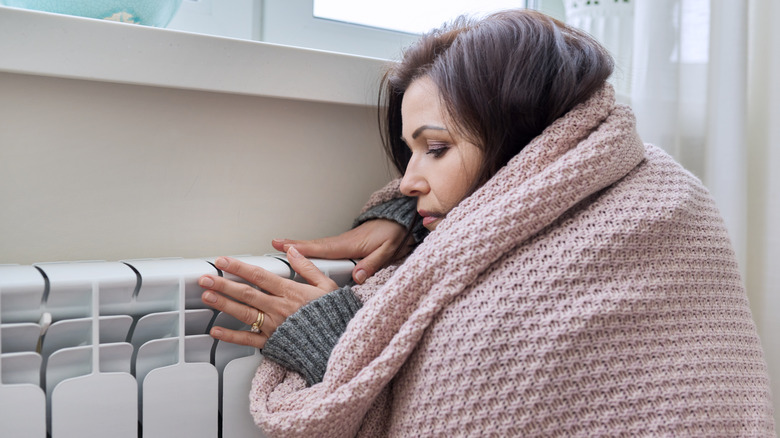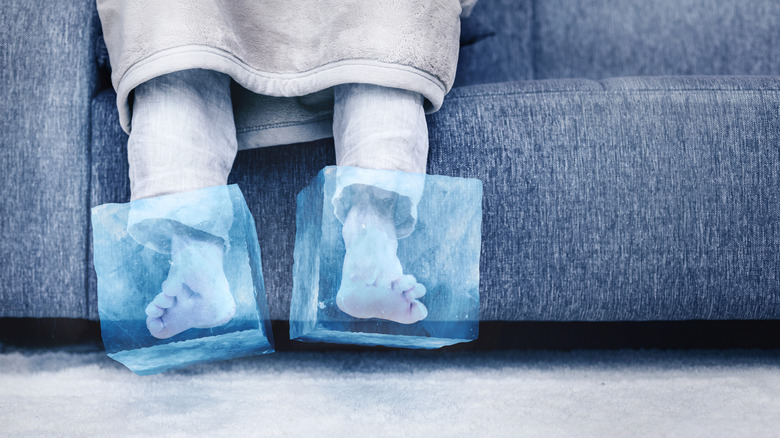What Happens To Your Body When You Live In A House Without Heat
Heating your home is important to avoid winter chill, especially in northern climates. Unfortunately, things can break and cause you to have to be without heat until it's fixed. Alternatively, a heating bill might be too high to pay right away, and you might be left without heat until it's paid. Either way, not having heat can cause a severe health problem that can lead to death without treatment. Check in on your loved ones to make sure they're not going without heat, especially vulnerable individuals like older adults and those who drink or use recreational drugs (via the Centers for Disease Control).
Americans will spend more on heat this winter due to rising fuel prices and demand, according to NPR. About half of the people in the United States use natural gas to heat their homes, and they can expect to pay about 30% more in 2021. Electric heat will cost about 6% more. Not many households use propane or heating oil, but those who do will see an even bigger increase in cost. Propane will cost 54% more, while oil will cost 43% more.
If you're having trouble paying your heating bill, check to see if you're eligible for the Low-Income Home Energy Assistance Program (LIHEAP). If your heat is not working, contact a professional to get it fixed. Stay with loved ones or in a hotel until your heat is fixed or turned back on. It's too dangerous to live in a house without heat.
Hypothermia
When you think of hypothermia, you probably imagine someone getting caught in an avalanche while skiing or someone falling through ice in a lake. However, per the Centers for Disease Control (CDC), hypothermia can happen indoors when your body temperature is abnormally low. The cause of hypothermia is being exposed to cold temperatures. As a result, your body starts to lose heat quicker than it can create it, and you'll use up your stored energy, causing your body temperature to get dangerously low.
Low body temperature affects your brain, and you may not be aware of what is happening. While hypothermia is likely to occur when it's freezing, it can also occur in warmer temperatures above 40 degrees Fahrenheit. In addition, you can get hypothermia if you're cold from water, sweat, or rain (via the CDC).
Shivering is one way your body will try to warm you up, but when your body temperature gets too low, you could stop shivering. The CDC reports other signs of hypothermia — exhaustion, confusion, slurred speech, and memory loss. Babies, however, show different symptoms that include low energy and cold skin that's bright red. MedlinePlus adds other signs like paleness, slow breathing or heartbeat, and poor coordination. If you have these symptoms, seek emergency medical help. If hypothermia goes untreated, it can lead to cardiac arrest, shock, and coma, and it can be deadly.
Frostbite
Frostbite can happen when you're exposed to cold temperatures and is when part of your body is freezing, per the CDC. Frostbite typically affects the toes, fingers, ears, or face and can lead to permanent damage and even amputation. You're at a higher risk of getting frostbite if you take beta blockers, have poor circulation, or aren't dressed for the cold. MedlinePlus adds other risk factors — peripheral vascular disease (a blood circulation disorder), smoking, diabetes, and the Raynaud phenomenon, which causes decreased blood circulation to the fingers.
Signs of frostbite are numbness, skin feeling hard, paleness, redness, and pain. You might not know you have frostbite because the affected area could be numb (via the CDC). MedlinePlus adds that you could feel a throbbing or aching pain, and redness and pain can worsen as the area warms up. Before the numbness sets in, you might feel that tingling feeling you get before a limb falls asleep.
Seek immediate medical attention for frostbite by either calling 911 or going to an emergency room. Then, get into a warm space right away to get out of the cold temperatures and wait for help.



